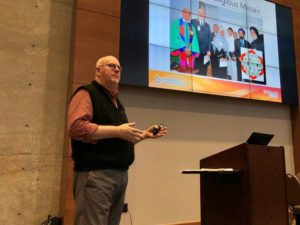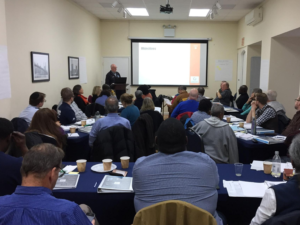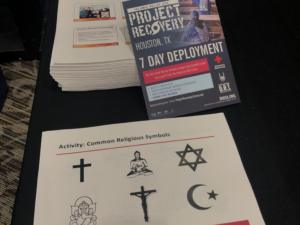Trainings
Our instructors have developed exceptional educational resources and provide training in all-hazards mitigation, preparedness, response, and recovery to religious leaders, houses of worship, and faith-based agencies as well as offering NGO and government agencies on how to best partner with and conduct outreach in faith-based communities.
The Roles of Religious Leaders in Disasters: In times of crisis, an estimated 60% of Americans turn first to their religious leader for advice and direction; in low-income and immigrant communities, this percentage has been found to be even higher.
All courses may be customized for your organization, at your location or at NDIN headquarters in NYC
Emotional and Spiritual Care Trainings provides training for disaster chaplains and spiritual care workers who are willing to volunteer as spiritual care givers during crises, at disaster sites, mass care facilities, and other locations.
Spiritual Care Worker Training: This course prepares leaders and caregivers to provide basic spiritual and emotional care during deployment in emergency settings such as mass-care facilities, evacuation centers, and Point of Distribution (POD) sites, as well as within their own house of worship or religious institution. This 4-8 hour training provides a basic introduction to Disaster Spiritual Care, Disaster Mental Health, and Self-Care, in an interactive format. (FEMA’s on-line IS 100 course on the Incident Command System must be completed prior to this training.)
(Learn More..)
Training for Trainers: This curriculum equips and credentials qualified participants to teach the NDIN Disaster Emotional and Spiritual Care Curricula for Disaster Chaplains and Spiritual Care Workers. Disaster interfaiths, disaster chaplaincy organizations or judicatories bodies/faith communities in need of trainers can contact NDIN and set-up this two-day training for NDIN-credentialed chaplains. (Pre-requisite: two-day Disaster Chaplain Training and ICS 100)
•By Invitation Only
(Learn More..)
Engaging Faith Communities in Disaster: Increasing religious literacy & competency in crisis settings and training provides an overview of why and how to engage and work with faith communities during crises, disasters and public health emergencies. The modules demonstrate how diverse religious and cultural practice increases partner capabilities and builds whole community resilience. The course offers tools (tip sheets & a field guide set) and foundational skills to competently engage religious leaders and congregations in the field.
Emergency Rest Center (ERC) Training: This training equips houses of worship to self-activate in times of crisis to offer hospitality and safe haven to the public during emergencies or evacuations. Learn how to self-activate for short-term service in partnership with local emergency management agencies
(Learn More..)
Preparedness Training For Faith Communities covers all-hazards readiness, response and recovery, including both practical assistance and spiritual care; specifically tailored to houses of worship.
• Individual & Household Preparedness: INDIVIDUAL AND HOUSEHOLD PREPAREDNESS trains religious leaders and faith communities in an all-hazards approach useful in any emergency, from power outages and fires to hurricanes and terrorist attacks. The source focuses on why and how individual and families can prepare for all hazards.
• HOW Ready (House of Worship Ready): HOW READY (House of Worship Ready) is a preparedness training specifically for houses of worship and focuses on building resilient faith communities and neighborhoods. The curriculum includes such topics as the unique role of religious leaders in disaster, limiting the impact of a disaster, making an emergency plan, connecting with volunteer opportunities through local disaster response and recovery organizations, and collaborating with other organizations in the community.
Disaster Tip Sheets for Religious Leaders explores disaster resilience in a one-day training “Managing in Chaos: Serving in Disaster” based on 16 all-hazards tip sheets for religious leaders. (Learn More)
Other Offerings
Preparedness Planning Technical Support helps houses of worship develop written emergency plans, organize operational disaster response teams, and create community disaster response networks.
Contact us
Pandemic Influenza Planning Guide helps houses of worship prepare for the potentially massive impact of a world-wide public health disaster. Using a template for NYC houses of worship and the NYC Department of Health and Mental Hygiene, it raises significant questions to start asking now and lays out practical steps for short-term and long-term preparations. Trainings related to this guide are available.
Contact us



